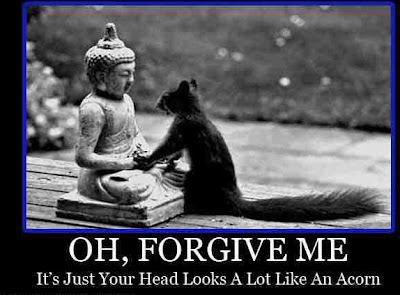What's often overlooked in the Zen story about Hui-Neng, his pursuer, and the robe and bowl on the road is that the pursuer, Ming, is not just a stock character whose only purpose is to add a villain to the story. Our minds so quickly disregard Ming, deny - or rather don't consider - his buddha-nature, and forget that he was a flesh-and-blood person just like Hui-Neng, just like you, just like me. That the story is obviously legend doesn't excuse us from overlooking him. In the story, we sympathize with the imaginary Hui-Neng and despise the imaginary Ming.
The story tells us that Ming was once a general of the fourth rank. I don't know what "the fourth rank" means, but it sounds fairly impressive. He left the military and entered the monastery, and was obviously close to his teacher and Hui-Neng's benefactor, the Fifth Patriarch. And although the story says that he and other monks became jealous of Hui-Neng's being presented with the robe and bowl, in his mind, he was likely protecting the dharma and the honor of his teacher and the monastery as he pursued Hui-Neng.
He fell into the delusion of drawing lines where none existed, which gave rise to anger and violence. In his mind, there was "right" and there was "wrong," and he was "right" and Hui-Neng was "wrong." His mind also gave rise to divisive concepts such as "vengence" and "injustice," and "good" and "evil." In reality, there are only things as they are and as Shakespeare noted, it's our mind that divides things one from another.
We are like this ourselves. We separate "self" from "others," "friends" from "enemies," "neighbors" from "foreigners." Once these divisions are made, we cease to regard the one on the other side of our imaginary line as a person, as having buddha-nature, and this gives rise to brutality and ultimately to the unspeakable atrocities performed by men.


2 comments:
I've appreciated your companion pieces on the Hui-Neng legend. This was a pivotal story in my own, for lack of a better word, "spiritual" journey because I remember being disturbed that the monks wanted to do harm to Hui-Neng. Like many others, when I first became interested in Buddhism and Zen, I came into it with this idea that Buddhist monks were all saints and had seen the futility of violence, jealousy, etc. This story, though, gave me an opportunity to explore just how deep some delusions become, and, as you say, how easy it is for us to draw lines where there are non.
Thanks much for these commentaries.
Thank you for your words. I do plan on posting a few more comments on this koan.
Post a Comment